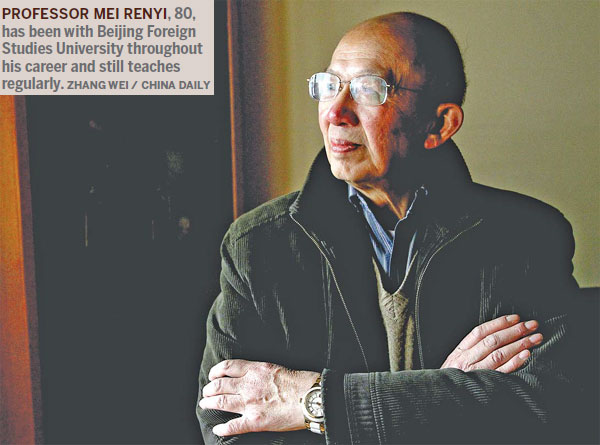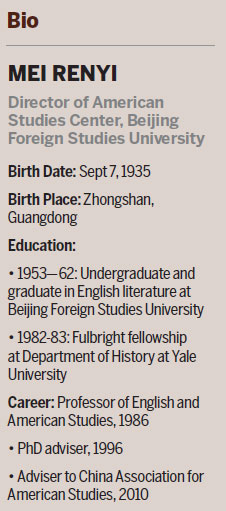How to understand Americans

A veteran professor who teaches China's creme de la creme shares secrets of language mastery and analyzing US policies
Mei Renyi's career trajectory has taken him from language instruction and English literature to American studies and eventually to cross-cultural studies. The turning point came in 1982 when a Fulbright scholarship enabled him to go to the United States, "to study either American literature or American history". Mei took up the latter.
Mei considers the study of the history of American diplomacy as the "hub", from which he extends his research into various related areas. "When you dig deep into this subject, you'll inevitably encounter issues of American culture," he says.

"Then you'll have to come to terms with Chinese culture. The lines of academic disciplines tend to blur as you delve into each of them. You'll have to possess the ability to transcend and merge. I'm still in the process of fusing different parts."
The 80-year-old professor at Beijing Foreign Studies University, where he is director of the American Studies Center, is an expert who straddles these fields. He still teaches regularly. His advice for youngsters in need of a direction is: Follow your heart and let your curiosity take you to explore all the options out there. "Even at our American Studies Center, we have very few compulsory courses. Most are electives."
For students of English as a second language, Mei suggests that "grammar is something one should have some knowledge of, but one should not be too rigid about it. The more you dig into it, the more perplexed you'll be". There is a "threshold" in language learning, he says, beyond which one will attain a certain freedom in expressivity. And that, according to him, is "the feel of the language".

Instead of cracking the codes of grammar, Mei advises students new to English take up reading, specifically simplified material that uses no more than 3,000 words, equivalent to books in the young adults section. Thirty to 40 of these volumes should be taken up, of which a dozen must be read several times - to the point where the student can recall phrases and sentences. "That is when you can shake off the sway of your native language," he says.
For advanced students, Mei recommends essays as the main reading material, "rather than fiction". Essayists come from more than the realm of literature. He cites Winston Churchill, whose nonfiction writings wielded wide influence. "We like to study John F. Kennedy's inaugural speech, but it follows the literary tradition of the genre in its structure and its sentence patterns," he says. "Language is power. When you become aware of that, the teacher should let go and you'll know what to absorb from your reading."
Mei attributes Barack Obama's initial success at his run for the US presidency partly to his talent in maximizing the power of language to communicate with the American public.
"China has achieved a great deal in elevating English as a second language. But we have not come up with a full set of theories on the methodology. Each school may have its own practice," Mei says. "We cannot depend on the West for theory because it should come from practice, which we have in abundance. Sticking to one linguistic theory from the West won't get you where you want to be."
The obstacles encountered can be uniquely Chinese, he says. The lack of distinction between the sounds "l" and "n", for example, pervades many parts of China. A Chinese teacher knows how to fix it "in one stroke", he illustrates, an ability only someone who teaches thousands of Chinese can grasp.
Mei has been with Beijing Foreign Studies University throughout his career. Alums from the school are now pillars of China's diplomatic structure, as well as other fields. While proud of them, he says a school education can only lay a foundation. Whether they ultimately become interpreters for senior leaders or executives for international businesses will depend on many factors, he adds, which include opportunities, the ability to adapt and change direction, and chance.
Switching from language as a tool to the study of all things American, Mei is often consulted on news events such as the upcoming presidential election. Speaking of Donald Trump, the Republican front-runner, he says populism is indeed on the rise in the US. "When liberalism reaches an extreme, conservatism comes out in response. This happened when Ronald Reagan was first elected to the White House. The urge for change has carried on to the present day."
However, an edge at this stage for Trump does not translate into a similar lead next summer, he cautions. "It's still early to reach a conclusion as to who will win. But the sentiments for someone singing a different tune definitely say something about what's happening in that country."
When it comes to possible changes in the US' China policy, Mei says any incoming US president will have to be "pragmatic" once he or she takes office. "It does not matter whether a candidate sounds soft or tough on China. The key is the reality of China and its size. You simply cannot afford to ignore it."
On China's side, Mei believes what's important is to "mind our own business and make our country better". "We have learned not to heed too much the election politics across the Pacific because what's said in campaigning has little to do with what policy is actually implemented eventually."
Mei opines that there is a "gap" in mutual understanding between China and the US. American scholars like to use "uncertainty" when forecasting China, and some in China, in a similar vein, read too much into the signs of "American decline", he says. "A crisis we may have is whether our prediction for the US turns out to be correct. The same applies to our prediction of ourselves."
To prevent calamitous mismatches in understanding, it is imperative we not only know each other's languages, Mei notes, but have intimate knowledge of the other side's thinking process. "On that we have only scratched the surface."
Contact the writers through raymondzhou@chinadaily.com.cn
(China Daily European Weekly 01/08/2016 page20)
Today's Top News
- New engine powers cargo drone expansion
- China to boost intl cooperation on green tech
- Factory activity sees marginal improvement in November
- Venezuela slams US' 'colonial threat' on its airspace
- Xi: Strengthen cyberspace governance framework
- Takaichi must stop rubbing salt in wounds, retract Taiwan remarks






























